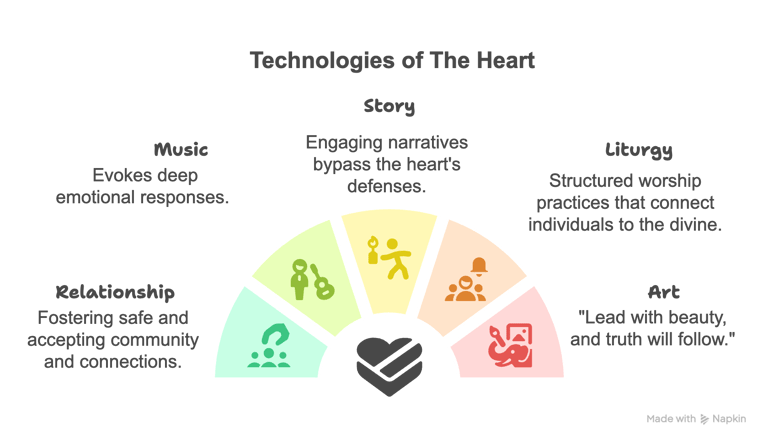4. The Heart of the Matter Part 2: Why Information Alone Can't Change Lives
Brandon Booth
6/23/20256 min read
Never miss a post! Signup for my email updates today and get expert guidance delivered directly to your inbox!
Last week we explored the six theological assumptions that fuel real heart change. But here's what I hear from ministry leaders all the time: "This sounds great, Brandon, but doesn't information matter? Don't people need to know the truth?"
Today I want to show you exactly why information-based ministry falls short and how heart-centered ministry creates lasting transformation. Building on Simeon Zahl's insights, we'll explore the crucial difference between these two approaches.
The answer isn't to throw out information—it's to understand its proper role.
The Faulty Information-Based Approach
Many ministries assume that if people just knew the truth, they'd change. And this feels completely logical for several reasons.
We live in an information age where knowledge equals power.Google has made us believe that the right information can solve any problem.
Awareness and education have been our primary model for "helping people"—whether it's public health campaigns, financial literacy programs, or anti-drug education.
Information-based approaches are easily measurable and feel productive. We can track how much content we've delivered, test people's knowledge, and see concrete results.
What this looks like in practice:
Here’s a few examples of what it looks like when we default to information transfer as our primary strategy,
Sermons focus on extracting principles for Christian living from Scripture—three practical steps for better marriages, better biblical principles for financial success, etc.
Bible studies emphasize knowledge transfer and correct answers, with success measured by how well people can recall what they've learned.
Programs are designed around curriculum and content delivery, the goal becomes simply moving systematically through topics or books of the Bible and success is measured by how much content we’ve slogged through.
But here's the problem with this approach:
Think about the person in your church who can quote Scripture extensively, knows all the "right" answers in Bible study, but whose life shows little evidence of transformation. They know what they should do, but their heart hasn’t been changed to want it. Knowledge alone doesn't create the desire necessary for change.
Or consider what happens when we tell someone struggling with anxiety to "just trust God more." We often create shame and guilt rather than hope. They know they should trust God—they've heard the verses, they understand the theology—but their heart is still captivated by fear. Our information-heavy approach makes them feel like failures rather than beloved children who need healing.
This creates a vicious cycle. When people feel like they're failing a test they already know the answers to, their hearts close up even more. They begin to see God as a demanding teacher rather than a loving father, which makes them less likely to open up about their real struggles. The very approach we think will help them actually reinforces their resistance to change.
Here's the core insight we need to grasp: hearts are changed through emotional encounters with God, not information.
Remember from our previous article: people don't change unless they want to. The key to changing people is to appeal to their hearts using what we called "technologies of the heart"—story, beauty, relationship, and experience. Information becomes powerful when hearts are already engaged and open, but it can't create that engagement by itself.


But information is still important in heart-centered ministry:
First, information reveals God's character and truth. We desperately need to know who God really is—his love, his grace, his delight in us. But this information becomes transformative when it's communicated through story, relationship, and experience rather than just propositions.
For example, the parable of the prodigal son doesn't just tell us God forgives—it helps us feel the father's heart of joy and celebration. We experience the father's eagerness as he runs toward his returning son. We feel his extravagant love in the robe, the ring, and the celebration. The information about God's forgiveness becomes emotionally compelling because it's wrapped in a story that engages our hearts.
Second, information enables self-understanding and discernment. We need to understand our own hearts, recognize our patterns of sin, and discern God's will for our lives. But this self-knowledge becomes helpful rather than condemning when it comes in the context of already experiencing God's love.
The proper sequence makes all the difference:
When someone's heart is already engaged—when they've experienced God's love and delight—they become hungry for information about him. They want to know more about this God who loves them. They're willing to examine their own lives because they trust that God's intentions toward them are good. Information becomes a gift rather than a burden.
Without the heart-first approach, information becomes sterile and ineffective. It can't overcome the heart's natural resistance to change. It often increases guilt and shame rather than creating transformation. Most importantly, it treats symptoms (behavior) rather than the root (heart desires).
Christ Is The Foundation For This Approach
This isn't just a ministry strategy—it's the biblical pattern for how God works with us.
"We love because he first loved us" (1 John 4:19). This verse captures the entire sequence: God's love comes first, our response follows. God doesn't lecture us into love—he demonstrates his love first through Christ. Only after we experience his grace do we become willing and able to respond.
Jesus didn't start by telling people all the ways they needed to change. He demonstrated God's heart toward them through healing, acceptance, and compassion. Think about the woman caught in adultery, the tax collector Zacchaeus, or the Samaritan woman at the well. In each case, Jesus led with grace and acceptance.
Then he taught them about God's character, their identity, and what needed to change in their lives. Even his most challenging teachings came in the context of relationship and demonstrated love. People were willing to hear difficult truths from Jesus because they had already experienced his heart toward them.
Your Next Step
Begin evaluating your ministry's approach with these reflection questions:
When you look at your ministry's main activities, what percentage are primarily informational vs. experiential? Be honest about the balance. Many ministries are heavily weighted toward information transfer. There's nothing wrong with teaching and explaining—but if that's 90% of what you do, you're missing the heart.
Brainstorm a few ways you can use "Technologies of the Heart" to support and make your information more effective. Think about:
How could you use story to communicate the same truths you're teaching? Instead of just explaining God's faithfulness, could you tell stories of how he's been faithful to you or others?
What would it look like to create more relational contexts for learning? Could your Bible study happen over a meal? Could your teaching include time for people to share their own experiences?
How could beauty, music, or art enhance your teaching? What if worship wasn't just the opening act but was woven throughout your teaching time?
The goal isn't to eliminate information—it's to make sure that information serves heart transformation rather than trying to drive it.
What's Next
Understanding how hearts change is powerful, but now you need to weave this truth into everything your ministry does.
In the next article, I'll show you how to bridge these theological insights into creating a specific Theory of Change for your unique ministry context—moving from universal principles to your particular calling. We'll explore how to take everything we've learned about heart change and apply it to your specific ministry situation.
Ready to transform your ministry approach? I'd love to help you think through how to make your ministry more heart-centered while still honoring the crucial role of truth. Every ministry context is unique, and applying these principles requires wisdom about your particular calling and community. Schedule a free 30-minute conversation with me, and let's discuss how you can integrate heart-first ministry into your current approach.
-------------------
This is the fourth article in our series "A Theory of Change: Building a Ministry that Actually Changes Lives!" ← See the previous article, or check out the next article here →


Let's build!
Connect with me today and let's start building your ministry that will change lives!
© Brandon Booth, 2025
Expert guidance for nonprofits and ministries.
Brandon Booth



